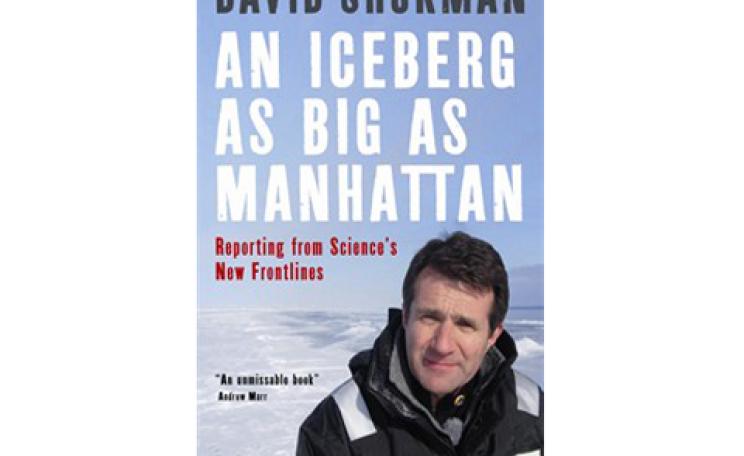Climate Change Denial is the new book from ecologist Haydn Washington and the founder of Skeptical Science, John Cook, and I bet from the title alone you've already decided whether or not you agree with them. The book addresses the phenomenon of climate change denial, and wonders why even ‘as the climate science has become more certain, denial about the issue has increased.’
In the reply to their own question, the authors suggest that denial is a fundamentally human response to things that scare us. It's a matter of psychology, the shutting out of bad news. As such, it's a natural and entirely understandable occurrence but it is delusional. And when a delusion leads us to ignore danger, denial can become pathological.
Denial is a loaded term of course. Those who disagree with the mainstream view of climate change, that it is happening and is caused by human activity, prefer to call themselves climate skeptics. The authors disagree. A skeptic is a seeker of truth, while much of what is written about climate change is more a case of ‘the denial of a truth one doesn't like.’ It wouldn't be fair to tar everyone who disagrees about climate change with that same brush but it certainly applies to a large percentage of the ink spilled in recent years.
To begin with then, the authors recap climate science, talking us through the carbon cycle, the greenhouse effect, the natural changes and the man-made ones. ‘To a certain extent the science is basic’ we're reminded. ‘We know that the CO2 level is increasing, we know it is coming from fossil fuels being burned by humans and we know that CO2 is a greenhouse gas. This means there is an energy imbalance in the atmosphere. Where does that energy go? It stays in the atmosphere and heats our world.’
This is the science as accepted by every academy of science in the world and by 97 percent of climate scientists. That it isn't accepted by a similar ratio of the general public is due at least in part to a concerted denial movement. Conspiracy theories, fake experts, misrepresentations and cherry-picked data proliferate, much of it sponsored by those with an interest in preserving the status quo. It is well known that Exxon has been a major funder of dissenting climate work, in partnership with the Global Climate Coalition. Koch Industries has since picked up the baton. This is not the truth seeking of true skepticism - it is big business paying millions to protect their own interests, by sowing doubt and kicking up dust. Again, not a charge we can level against everyone who disagrees, but a major factor in undermining climate science and delaying action.
Lobbying and paid experts are the tip of the iceberg. They're the obvious villains but denial only takes hold because, fundamentally, it is something we want to believe. ‘When struggling with the trauma of change, segments of society can turn away from reality “in favour of a more comfortable lie,”’ say the authors. It doesn't fit with our libertarian politics, or our free-market economics, or our consumer lifestyle. Governments don't want to do things that are unpopular. Denial has a ready audience, and it breeds a conspiracy of silence.
At this point, those looking for another excuse to sneer self-righteously at the climate denial movement might get a wake up call of their own. Washington and Cook are adamant that we are all implicated. ‘We are compelled to conclude that we the people also have something to answer for. We as a society let denial prosper.’ Many of us call on the government to act, while secretly hoping they won't. We want to keep driving and shopping, so we march and sign petitions. When our representatives fail to legislate, there is no outcry. When they return from another round of failed talks, we don't protest. We quietly prefer them to pretend. After all, if they actually paid attention to our petitions, they might take away our cars, holidays, and cheap imports.
The book concludes with some strategies for overcoming denial and a whistlestop tour of climate solutions. Above all, it calls for us to face reality. ‘The climate crisis is not a fixed and immutable doom laid upon the world. It is a human-caused problem that has human-created solutions... The key first step is to stop the delusion, to stop denying we have problems that need to be faced.’ Climate Change Denial is a wise and timely book. It is well researched and painstakingly footnoted. It deserves an audience but then, you had already decided from the title whether or not you agreed with the book, right?
| READ MORE... | |
 |
REVIEW The Fate of Greenland: Lessons from Abrupt Climate Change The Fate of Greenland isn’t an easy read, says Jeff Holman, but what it lacks in style, it more than makes up in scholarship |
 |
REVIEW Seedbombs: Going Wild with Flowers Josie Jeffery’s opus is a call to arms for gardeners and the community spirited alike, says Ruth Styles |
 |
REVIEW Saving the World’s Wildlife: WWF’s First Fifty Years Written to coincide with the WWF’s half century, Saving the World’s Wildlife is a fascinating account of the 50-year history of the world’s most famous eco charity |
 |
REVIEW The New North: The World in 2050 by Laurence Smith Global weather patterns have always been unpredictable but current changes are being amplified by the impact of people, consumption and pollution. In The New North, Laurence Smith looks at what the next four decades could bring – both for the weather and for us |
 |
REVIEW The Wisdom of Sustainability: Buddhist Economics for the 21st Century Combining a detailed dissection of our unsustainable economy with an introduction to Buddhism, Sulak Sivaraksa’s economic vision provides an alternative to globalisation |






